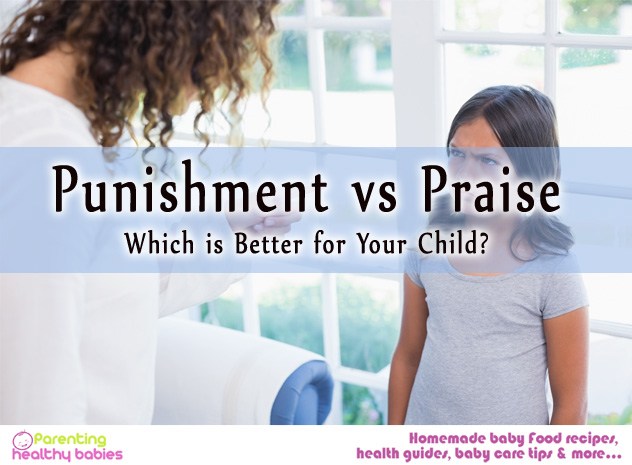Raising a child is a tough job on any given day. As a parent, you’re always struggling to find the right mix of parenting to bring up your child in the right way. This calls for a good mix of effective disciplining measures along with love, praise and encouragement for your child. That brings a dilemma to mind – punishment vs praise – which of these is better for my child?
Well, there is no easy answer to this question. But a good way of deciding how much punishment or praise to give your child is by understanding the role punishment and praise play in your child’s life.
Read More: 11 Things To Do When Your Child Lies
Does a child need to be punished?
Every action or behavior that your child makes has a set of consequences. This is the primary goal towards which a parent tries to steer his/her child. For example, if a child does not do his home work on time today, his/her teacher will pose a problem at school tomorrow for the child. Parent often punish children to assert the importance of an appropriate or correct behavior. If a child does not clean his/her room and throws toys everywhere, he/she is punished for it, to aaert the importance of keeping a room clean. This punishment often comes in the form of harsh physical treatment such as a slapping, yelling or spanking a kid. But you have to ask yourself a parent- does this really change the behavior of a child? Does it guarantee that the ‘bad’ behavior will not occur again?
Sadly, no it does not.
So a parent might ask – how can I teach my child right from wrong without punishment? How will he/she know the importance of good behavior? The answer is not use punishment, but to find alternative ways of changing your child’s behavior.
Read More: Treatment For Depression In Children
How can I change my child’s behavior without punishment?
The best way to change your child’s behavior is not through harsh physical punishment. This is because when you behave aggressively by spanking or hitting your child, a child replicates your behavior. He/she may too start behaving in a similar way, by hitting, biting, kicking or scratching others. There are alternative ways to show your child the correct way to behave such as ;
Read More: 11 Tips to Discipline Your Kids
1. Actions speak louder than words
As a parent, you have to serve as a role model to your kids. F you want them to clean their room, you have to keep your room clean first. Similarly, if you do not want them to use abusive language, you have to eliminate the use of abuses from your own personal speech. Do as you want your child to behave.
2. Consistent consequences
Parenting has to be consistent. For example, if you set the bed time as 9 p.m. daily, then you will have to follow it up by ensuring your child has had dinner and is in bed at 9 p.m. If your child does not finish his/her work by this time, do not allow them to watch TV before sleeping. If you are consistent with rules, enforcing them gently but firmly on a daily basis, a child soon becomes accustomed to them and begins following them as per routine. In the same way, If a child hit his/her sibling, he/she will not be allowed to go to play in the park that day and so on.
Read More: 31 Must Know Pro Parenting Tips
3. Use timeout
Timeout is merely taking the child away from the current setting so that he/she may review his/her actions. For example, if your child plays with a ball inside the house when you have repeatedly asked him/her not to, you can take the ball away and make your child sit quietly in a room for 5 to 10 minutes. Enforced consistently, timeout leads to good results.
4. Tell your child what to do, not only what not to do
Sometimes, we forget that a child needs direction. We constantly yell at kid – ‘Don’t touch that painting!’, ‘Leave my drawer alone!’, ‘Don’t fight with your sister!’.That’s a lot of don’t, isn’t it? But the question is – did you tell your child what ‘to do’? tell your child what you expect of him/her – ‘Play with your sister’, ‘Sit quietly and watch TV’, or ‘Be careful around the painting as it can fall down’, and so on. Tell your child the right way expected from him/her. Don’t just become a constant negative source of correction of your kids behavior.
Read More: 10 Warning Signs of Potential Psychological Problems in a Child
Does a child need to be praised?
The answer is yes, yes, yes. The benefits of praising your child are many. Your child develops self confidence in his/her abilities and begins to shine in the glow of your approval. Parents’ acceptance and approval of their child’s behavior must be communicated through regular and genuine praise for your child. This is a huge source of motivation for your child towards behaving well and doing things that make you praise him/her.
But praise also has to be delivered effectively to generate best results. How can you do this?
Praising a child incessantly without true meaning or recognition of efforts is also pointless. Praise may be of 2 types – Praising of natural inborn traits or praise of efforts. In general, it is better to praise a child for his/her efforts or for a job well done. For example, if a child draws a beautiful drawing or patiently solves a jigsaw puzzle, you can praise the effort and time taken to do a job well. Likewise, if a child tries to get ready on his/her own in the morning, it is worthy of praise. Even incomplete efforts that have involved hard work on the child’s part must be praised.
Read More: 6 Ways to Discipline Your Child
However, praising a child on innate traits such as beauty or physical characteristic does not yield good results in the long run. It makes a child take for granted his/her looks or hair or such things which do not require any personal growth. So this type of personal praise should be limited, but not eliminated entirely.
Finally, be genuine in your praise. A child should feel that you truly appreciate his/her efforts. Random, sweeping praise does not yield much change in your child’s behavior. Specific praise for specific efforts is much more meaningful.
So a parent, you will have to develop a fine balance of skills to bring out the best in your child. And it is possible, through consistent and thoughtful praise and well thought out consequences for your child’s behavior. A long lasting, caring, two way relationship may be achieved through your considerate parenting skills.













